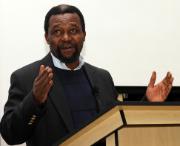
Delivering the second 2012 Teach-In lecture yesterday (24 July), Mr Joel Netshitenzhe, Director of Mapungubwe Institute for Strategic Reflection and member of the National Planning Commission, asked: “if the assumption is correct, that we seek to attain a better quality of life for all, then the question should be, ‘What do we do to achieve that?’.
He said South Africans have a great opportunity to create a social compact for higher growth and development. “This requires activism from civil society; the impulse on the part of political leadership to do right since self-correction is not automatic, the participation and activism of civil society is crucial,” he added.
In his talk, entitled: “Can South Africans forge a social compact for higher growth and development?” Mr Netshitenzhe outlined the concept of a social compact and what it will take to establish one in South Africa.
South African citizens can achieve a social compact, which will go a long way in alleviating current disenchantment, poverty and mistrust, he said.
According to Mr Netshitenzhe, an analysis of public discourse shows widespread recognition that the current levels of unemployment and poverty are unsustainable, which is not surprising given that South Africa has the highest inequality in the world with 20% of the poorest South Africans living off 2.3% of the national income, and the richest 20% sharing 70% of the national income.
He said certain economic elements such as how to take advantage of the building boom in sub-Saharan Africa and make use of the many infrastructure programmes to reduce the cost of doing business in South Africa, and ensuring the emergence of South Africa’s manufacturing capacity are critical in contributing toward economic growth, but it does not stop there.
As significant as the economic elements are, Mr Netshitenzhe explained that the process is cyclical; the economic and the social feed back into each other, and you can’t have true success in one area without working on the other.
He believes that leaders have an important role to play in the establishment of an effective and sustainable social compact, and certain types of leaders are required to attain that.
“Can we really talk about a social compact when senior managers’ salaries increase at double digits each year, yet they call on those in lower positions to tighten their belts?,” he asked.
He said previous attempts at establishing a social compact floundered due to self-interest of leaders. “If you want to achieve a social compact you need a new quality of leader across all sectors of society; someone who is interested in posing the question, ‘What role can my sector play and what sacrifices need to be made in order to meet the objectives?’”
Mr Netshitenzhe said the ability of leaders of various sectors to identify trade-offs and make difficult choices with the good of the social compact in mind is crucial. A preoccupation with short-term profit making is not going to enable a sustainable social compact; rather, a focus on long-term rewards and trade-offs will facilitate this, he said.
“You need a strong and legitimate state that has the capacity to intervene, not only in economic development but also in other areas if and when it is needed,” he added.
In light of widespread pessimism and disenchantment with government, Mr Netshitenzhe suggested that citizens remain optimistic, however challenging this may be.
“As pessimistic as we might be as a result of our recent experiences, this does not mean we shouldn’t be optimistic about our future. In our pessimism we shouldn’t discount totally the progress that has been made since 1994, but we do have the right to be impatient and to aim higher,” he added.
“Let’s have an optimism of the heart and pessimism of the mind,” he concluded.
Mr Netshitenzhe is the former head of South Africa’s Government Communication and Information Systems (GCIS) from 1998 to 2006, and former head of the policy and advisory unit in the presidency until 2009,
Dr Catherine Burns from Wits Institute for Social and Economic Research will deliver today’s lecture entitled “Digging Down into the Second Transition”.
Teach-In lectures continue at Barratt Lecture Theatre until Friday from 1pm – 2pm.
For more information about the Teach-In lectures visit: www.ru.ac.za/politicalinternationalstudies/teach-in
By Sarah-Jane Bradfield
Photo by Ross Shackleton.
